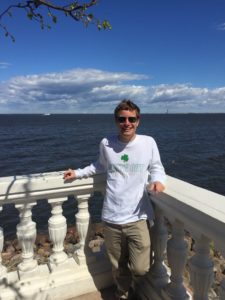 E-mail: mwisnesk@nd.edu
E-mail: mwisnesk@nd.edu
Language: Russian
Location of Study: Moscow, Russia
Program of Study: Russian Language and Area Studies Program (RLASP), sponsored by the American Councils of Teachers of Russian (ACTR)
Sponsors: Nanovic Institute for European Studies, College of Arts and Letters, and Center for the Study of Languages and Cultures (CSLC)
Blog URL: http://sites.nd.edu/sla2018/author/mwisnesk/
A brief personal bio:
My name is Matthew Wisneski, and I am a junior from Pittsburgh, PA. Currently I am studying Political Science and Russian, with a minor in Constitutional Studies. Last summer, I participated in Notre Dame’s “Mother Russia Calling” program, so I am excited to return to Moscow! I am hoping to use my Russian language skills in an eventual government career, hopefully with the State Department in some fashion. Here at Notre Dame, I play the trumpet in the Band of the Fighting Irish, and next year I will be an officer in the Russian Club.
Why this summer language abroad opportunity is important to me:
My SLA award for this summer has been crucial in facilitating my ability to study abroad in Moscow, and as a result, the grant will be a huge catalyst for further development of Russian language and cultural immersion. Thanks to the support of the Nanovic Institute, the College of Arts and Letters, and the CSLC itself, the SLA Grant covers more than half of my program’s expenses. As a result, the program is more financially feasible and takes away the burden of choosing between opportunities based solely on cost. However, the impact of the grant reaches far beyond this summer. Most apparent is that this program will teach me how to speak and live like a native Russian, which I could never fully appreciate in the United States. Additionally, I hope to use the experiences I gather as a catalyst for a future career in government. The State Department lists Russian as one of its critical languages, and so I believe that proficiency in Russian could bring some incredible opportunities within the government and in the international area. To conclude, I am incredibly grateful for the generous funding and look forward to making the most of my opportunities in Moscow.
What I hope to achieve as a result of this summer study abroad experience:
My primary goals for this summer involve greater linguistic and cultural proficiency, as I would like to use Russian in my career someday. To that end, conversation and listening are priorities for me because I find both of those difficult in a setting where I do not have to think constantly in Russian. I mainly want to learn how to understand and respond to rapid information and conversation so that I can have extended conversations with native Russians. Additionally, I would like to use this experience as a way for me to learn how to embrace new cultures and environments. Given my unfamiliarity with Russian culture and society at large, I am actually quite nervous about what to expect and, furthermore, not being able to communicate adequately with native Russians. Nonetheless, I am using my time in Moscow as a way to face my fears and challenges, to show that I can indeed do what sometimes I think is impossible. I hope to accept and solve problems of communication and to not be afraid to interact in spite of any shortcomings. In short, I want my summer in Moscow to be an academically and personally transformative experience.
My specific learning goals for language and intercultural learning this summer:
1. At the end of the summer, I will be able to carry on extended conversations with native Russians. 2. At the end of the summer, I will be able to read or listen to news media and understand the message. 3. At the end of the summer, I will be able to talk more about politics with native Russians and be able to talk about political culture in the United States. 4. At the end of the summer, I will be able to try new food and experiences without hesitation.